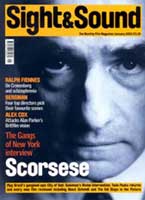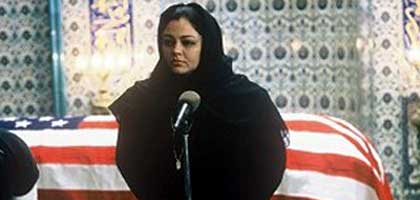
One day in September
Film of the Month: 11'09''01 September 11

Last year 11 world-ranking directors were asked to make a short film about the WTC terrorist attacks for 11'09''01. Peter Matthews views the results.
Producer Alain Brigand’s omnibus film 11'09''01 September 11 isn’t remotely adequate to its subject, but that’s stating the obvious. At this brief distance in time, no one has the perspective needed to digest the terrible reality or assign it a confident meaning, so even a better movie would still be awful. Right now the egoism of the artist’s vision is inescapably crass - and perhaps more so than such official propaganda as the recent television documentary 9/11, whose straightforward tear-jerking at least gave the American public the type of catharsis it recognises. Undeterred, Brigand asked 11 world-ranking directors to pitch in their two cents, with the gimmicky proviso that each segment last 11 minutes, nine seconds and one frame.
No doubt the mainstream media coverage of the calamity should be challenged, but its repackaging as an all-star auteurist concept - complete with camera flourishes, poetry and counter-ideological axe-grinding - isn’t an automatic improvement. The whole project virtually defines bad faith, and the best contributions are the ones that display some consciousness of the fact. The worst fail so abjectly on the score of basic decency that you have to wonder in which alternative moral universe their creators live.
If connoisseurship is applicable in such a context, then the booby prize goes jointly to Claude Lelouch and Sean Penn. With an impropriety bordering on the macabre, both turn the disaster into an occasion for heart-tugging whimsy. Lelouch used to be the romantic-slush specialist of the French new wave; still, one wasn’t prepared for his awesomely twerpy tale about how Ground Zero intercedes to settle a lovers’ tiff. The main character is deaf, and there’s dramatic irony galore as she putters around her flat almost but not quite catching a glimpse of the TV news. The portentously muffled soundtrack may be a homage to the dead as the director proposes, or it may be a last-ditch attempt to tone up a cheapjack mini-soap opera.
For a while the Penn episode seems a fine if slightly mannered portrait of a lonely widower subsisting on old memories. The astute casting of Ernest Borgnine invites us to fantasise that we’re watching archetypal little guy Marty in his dotage, and the actor creditably flaunts a now beached-whale corpulence without the least vanity. But it’s all for the sake of a jaw-dropping O. Henry finish which juxtaposes the collapsing Twin Towers with a miraculously resurrected plant - on the apparent principle that tomorrow is another day.
Since Penn is the sole American on board, his dinky sentimentality might be charitably extenuated as arising from the pressures of self-censorship. There is, however, a whisper of critique in the implication that lives matter even if they’re not sanctioned by CNN. This idea prompts louder editorial tub-thumping in other quarters - with varying degrees of taste, courage and coherence.
Veteran Egyptian director Youssef Chahine’s heart bleeds over the devastation in New York, which he certifies by having the actor who narratively impersonates him cancel a press conference then gaze glumly out to sea. Crocodile tears are confirmed when he briefs the politically benighted ghost of a US marine on his country’s murderous record from Hiroshima to Vietnam. Later ‘Chahine’ reverses a shot of the collapsing towers and comments sagely that it’s tougher to bring them back in real life. Finally the reciprocal ghost of a Palestinian suicide bomber shows up to heckle him for pitying dead Americans - though the evidence may be politely described as token.
It’s an indigestible brew of magical realism and polemic that feels especially gassy alongside Ken Loach’s clean, surgical rigour in arguing his anti-imperialist case. Accepting that fancy fictions are unseemly under the circumstances, Loach employs the no-frills premise of a sympathy letter to America recited by actor and Chilean dissident Vladimir Vega. The rest is archival footage documenting the first 11 September - the coincidental date of the CIA-supported coup that toppled Salvador Allende’s socialist government in 1973 and led to the liquidation of untold thousands. Despite Vega’s earnest attempts to look respectful, the WTC attack is clearly regarded as a historical quid pro quo - the devil of American foreign policy has at last come home.
Loach the convinced militant can spare no time for liberal twaddle about causing offence. There’s something icy and inhuman in his stance; but it must be said that of the assembled talent, he takes the most considered risk. While others practise a similar book-keeping in oppression, none puts their neck on the chopping block quite so forthrightly.
Amos Gitai stages the aftermath of a ‘routine’ car bombing in Tel Aviv and expresses pique at how the smaller tragedy gets muscled out by the larger. Bosnia’s Danis Tanovic chafes correspondingly that the 1995 Srebrenica massacre will prove a journalistic flash in the pan. Continuing the plea for inclusivity, Mira Nair tells the true story of a Pakistani American branded an al-Qaida agent until posthumously vindicated as a hero - thereby reminding us that not every Muslim is a terrorist and not every victim a white, middle-class accountant. These three entries vacillate between strident finger-wagging and sheepish apology for existing. Not surprisingly, they don’t leave a strong impression - beyond the negative one of each film-maker’s choked anxiety.
But that in a way is their saving grace, since discomfort implies the dawning of scruples. In his loose guidelines to the artists Brigand cites the desirability of tempering emotion with reflection and granting a voice to everyone. On paper both sound reasonable. With half the globe screaming out in pain, it seems vital to point out that no single citizenry retains a monopoly on martyrdom or grief. The day the world changed was - if not business as usual, then just one of many charnel-houses past and future. But this relativising of atrocity is also obscene in that it denies the individual dead their unique and irreplaceable claim on our common humanity. Instead they are converted into ciphers, symbols, strategic pawns - which is what al-Qaida did in New York and what the Bush administration does now in memoriam.
As Slavoj Zizek observes, it’s necessary to hold together two opposing values at once - not only the abstract-political, but likewise the human-particular. That may appear an unimaginable feat of synthesis, yet the films by Idrissa Ouédraogo and Samira Makhmalbaf have a serious whack at it. Both investigate what might be called the politics of empathy.
Ouédraogo focuses on a gaggle of kids who spot a ringer for Bin Laden prowling around their village in Burkina Faso and aim to divvy up the spectacular reward money. The tall-tale charm of the work springs from its central caprice that the Saudi outlaw is a legendary figure for the boys, no more substantial than Jesse James or Darth Vadar. The joke has a perverse underbelly, of course, considering the nature of the designated folk hero - but therein lies the rub. While the suggestively named protagonist Adama worries about his sick mother lacking medicine, he can’t feel compassion for suffering much further afield and reverts to cliché. But so do we in projecting his daily experiences (the ethnographer’s paradise of the setting is more than a little sardonic).
A communicating bridge is required, and it happens that Makhmalbaf shows one being built. The Afghani schoolchildren in her piece know nothing of aircraft and skyscrapers; their co-ordinates are those of the refugee camp where a cataclysm is two men tumbling down a well. That’s why, when a solicitous teacher explains the facts of 11 September, she tactically translates them from the micro to the macro. Look at the chimney, she demands, and think of the tower. The fry remain unruly, however, and there’s no guarantee the lesson is a success. Still, we’re witnessing the very process through which solidarity is formed - by dint of sheer intelligence and discipline - the more incredible since retaliatory American fighters already darken the horizon.
In distinction to the querulous resentment manifested elsewhere, Ouédraogo and Makhmalbaf offer hope that some understanding can be achieved, however fragile. The final films register despair, though of utterly inimical kinds. Seventy-six-year-old Imamura Shohei bends his hand to the melancholy comedy of an ex-soldier who retreats from the universal nightmare by turning amphibian. When at the end snake-man slithers into the water permanently, it’s evident the director would be happy to join him. The message is patently: you’ve made your world, now lie in it and leave me alone. Indeed so little does Imamura feel engaged that he’s backdated the story six decades - if there’s a contemporary allegorical key, it’s not forthcoming.
Then again, dropping out seems like a good idea after sitting through 29-year-old Alejandro González Iñárritu’s non-narrative effort. The callowness of youth doesn’t excuse (though it probably explains) an unremitting monstrosity to put beside Damien Hirst’s remark that the WTC attack was "like an artwork in its own right". For much of the running time the screen is black, presumably to conform with the old Frankfurt School maxim that absolute horror should not be represented. But he proceeds to represent it anyway - in near-subliminal flashes of falling bodies that resemble an abominable variation on the diving sequence from Leni Riefenstahl’s Olympia. Iñárritu has attended too many private views as he’s plainly oversold on ‘edgy’ transgressiveness. The last frames materialise an Arabic text that speaks of being blinded by God’s light. More like hideous self-conceit.
